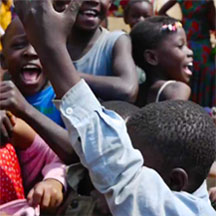With the support of the UNESCO PARTICIPATION PROGRAMME 2012-2013
The WFSF is setting up online learning infrastructures and procedures to run three pilot courses that will twine local face-to-face education with online learning of futures studies and foresight. Pilot courses take place in three separate locations: Lubumbashi, Democratic Republic of Congo; Cairo, Egypt, Penang, Malaysia. The project is directed to a diverse global audience, focusing especially on the needs of Africa, youth and developing countries. It will enable 60-90 young adults to become advocates of foresight with potential to influence others within their local communities. LEALA is also intended to increase the ability of WFSF community members to offer glocal courses. The project pays specific attention to the challenges of including in developing regions.
The three pilot courses and locations are very diverse and this makes them suitable pilots for the novel educational program being attempted. Pilot coordinators develop and define the local programme according to local needs and can to this end use the instruments offered in the context of LEALA. The main aim is to develop new approaches to providing tailored futures education in a variety of circumstances and environments. The project offers concrete experiment and experience and insight into the challenges of blended learning and of learning foresight. These may be expected to be usefull in evidence-based policy dialogues.
LEALA interprets futures understanding and practice as essential life skills and works on access to education for acquiring these skills (in line with UNESCO’s Education for All goals 3 and 6). Inclusive access to quality educational resources, blending e-learning and face-to-face learning and the provision of a database of resources for foresight education are on the LEALA agenda.
The 2012-2013 Pilot Programmes –
Cairo
 The Cairo pilot was set up to link into the launch of the Management of African World Heritage Online Masters Course of the Cairo University and the Institute of African Research & Studies. This is a pilot in which the futures content is added to a pre-existing course in another domain. In this pilot the online component consisted of the pre-existing online Masters Course, which was blended with the face-to-face gatherings supported by LEALA. While this online activity runs for a whole academic year, the live activities took place over the course of two days with participants from the course organisation, students, the partner institution, and the national UNESCO commission of Egypt—all experts with a specific focus on world heritage, but with only limited knowledge of the relevance of futures literacy.
The Cairo pilot was set up to link into the launch of the Management of African World Heritage Online Masters Course of the Cairo University and the Institute of African Research & Studies. This is a pilot in which the futures content is added to a pre-existing course in another domain. In this pilot the online component consisted of the pre-existing online Masters Course, which was blended with the face-to-face gatherings supported by LEALA. While this online activity runs for a whole academic year, the live activities took place over the course of two days with participants from the course organisation, students, the partner institution, and the national UNESCO commission of Egypt—all experts with a specific focus on world heritage, but with only limited knowledge of the relevance of futures literacy.
For full details and the final report please follow this link.
DR Congo
 In Katanga, LEALA was interlinked with the development education project Maono, in which workshop techniques and practical creative exercises for the participants were used. The live phase in the DRC was spread over two seven week periods in the summer of 2012 and spring 2013 (for a total of 6 days of workshops as well as individual follow up of participants’ work). The online work was conducted via email with four tasks with reading materials and accompanying questions set out for the participants. The participants were young adults from varying higher education courses.
In Katanga, LEALA was interlinked with the development education project Maono, in which workshop techniques and practical creative exercises for the participants were used. The live phase in the DRC was spread over two seven week periods in the summer of 2012 and spring 2013 (for a total of 6 days of workshops as well as individual follow up of participants’ work). The online work was conducted via email with four tasks with reading materials and accompanying questions set out for the participants. The participants were young adults from varying higher education courses.
Penang
In Penang the course was co-organised with the urban think-tank, Think City, in collaboration with the Right Livelihood College, with whom the course coordinator has prior relations. This pilot is the only fully-fledged short futures introduction course of the three pilot projects. It relied on live teaching and workshop techniques during two intensive consecutive days of activities. As the LEALA online tools for resource sharing were not yet available during the course preparation and implementation, the teaching materials for this course were supplied online on a dedicated website for the pilot, prior to the live teaching event (http://www.cityfutures.net). The participants were selected from emerging city leaders and project advisors from different parts of Malaysia, and also included participants from the Philippines, Singapore and Taiwan.
